
As we dive into part two of my rescue dog series, we’re going to be talking about a very serious issue…aggression.
Aggression (toward people and other animals) is one of the biggest reasons shelter dog’s get sent back to their rescue facility. It’s also a reason some people dump their rescue dogs on the side of the road again.
It’s unfortunate…especially as some rescues aren’t 100% straight forward about the needs and behavioral issues of some dogs. This is why it’s vital that if you’re going to rescue a dog that you look for a reputable shelter with quality staff and excellent reviews.
But what happens if you end up taking a dog home that has aggressive tendencies? Is all hope lost? Definitely not!
All dogs have the ability to change. You just have to be willing to spend the time and effort to help your dog overcome his/her aggressive tendencies.
How can you help an aggressive dog in your home? Here are my thoughts…
A Quick Disclaimer Before We Get Started
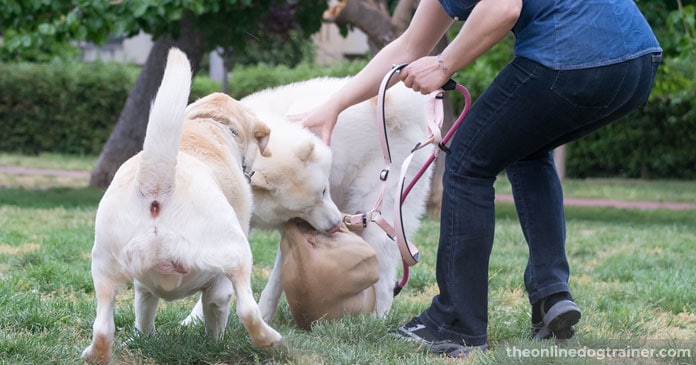
Before we get too far, I can’t stress enough that adopting a dog with aggressive tendencies is a huge undertaking and can be dangerous.
While I know all dogs can be good dogs and that it is possible to help any dog overcome aggressive habits, dog’s are powerful animals and there are risks associated with trying to manage this type of behavior.
If you have small children in your home, other pets, or friends/family members who live with you it’s important to think carefully about the risks of having an aggressive dog in your home. It may even be best to seek alternative options to ensure everyone in your household remains safe.
I’ll discuss some alternative options at the end of this article, so keep reading to find out what I recommend!
However, if you can house a dog with aggressive tendencies and are willing to put in the work to help your new canine companion thrive, let’s get into the meat and potatoes of how to help your pup…
Deciphering Your Rescue Dog’s Aggression Type
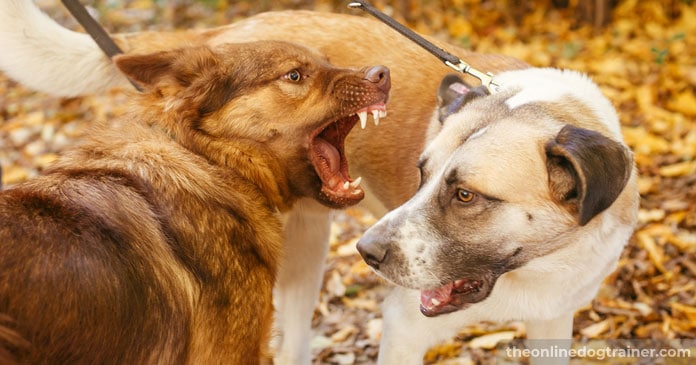
Believe it or not, there are different categories of aggression that your rescue dog might be dealing with. It’s important to first identify which type your dog struggles with so you can get to the root of the issue.
Dog-on-Dog Aggression
The first type of aggression I describe as dog-on-dog aggression. This is when your dog is friendly to other people, but has issues when other dog’s step into the picture.
For example, your dog might be a cuddly love-bucket at home, but the second you go to the park and see other dogs, your pup starts barking, growling, and trying to go after other dogs.
Why does this happen? Is it safe to have other dog’s at home with this problem? And how do you put an end to it for good? A little while back I wrote a detailed article on how to put an end to dog-on-dog aggression in your home.
Learn more about dog-on-dog aggression here!
Fear Aggression
Fear aggression occurs when a dog is fearful, suffers from anxiety, or feels threatened. This is very common amongst shelter dog’s who come from abusive situations.
Put yourself in your dog’s paws…
A dog’s only way to protect themselves is with their voice, their teeth, and their claws. If you were fearful, it’s likely that you would become defensive using your teeth to defend yourself at any cost.
How do you help your new rescue dog understand that they no longer have to be defensive and fearful? It all comes down to training, which builds a trusting bond between you and your dog.
I’ve written on the topic of fear aggression several times as it’s a huge issue. To best assist you with working on this type of aggression, I want to point you to an article that contains a really cool training video I filmed with a fearful dog named Buck.
Watch the video and learn how to manage fear aggression here!
Dominance-Based Aggression
Finally, it’s possible that your dog is suffering from dominance-based aggression.
This type of aggression occurs when a dog feels that they are at the top of the hierarchy…that they are the leader of the pack, so to speak. They make the rules and if you or another dog doesn’t fall in line with their wishes, aggressive behaviors to show dominance may occur.
If you believe your rescue dog has dominance-based aggression, I encourage you to read more about this specific type of aggression in an article I wrote recently…
Learn more about dominance-based aggression here!
The Ultimate Solution to Helping Rescue Dogs with Aggressive Behaviors
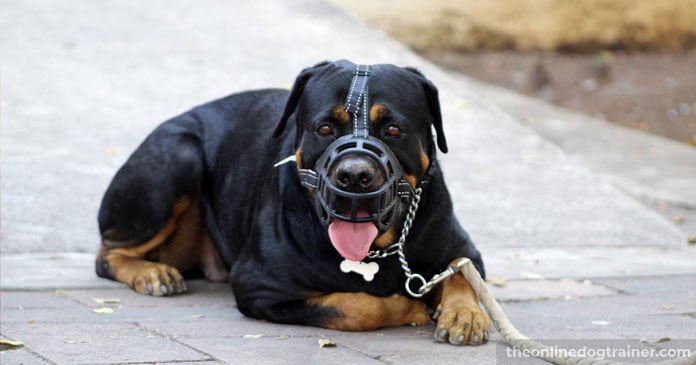
Ultimately, putting an end to aggressive behaviors in rescue dog’s comes down to your ability to put a solid training foundation in place.
Why?
When you put a training program in place—like my program The Dog Calming Code—your dog learns to relax, focus, and trust you as the provider. Once this relationship is established the pressure for your dog to have to use aggressive tactics to defend themselves, protect their things, etc. disappears.
Instead of lunging, biting, and growling, your dog will look to YOU for guidance and reassurance—regardless of whether they suffered from fear-based aggression, dog-on-dog aggression, or dominance-based aggression.
You have to remain dedicated to the process in order for it to work. While this might seem daunting, it’s really as simple as following some basic rules and keeping your dog on a routine.
If you feel overwhelmed by the idea of implementing a training program, I encourage you to take a look at my Dog Calming Code program.
In this program, I lay out everything you need to know, including 23 training videos that literally show you HOW to do everything step-by-step in real time!
Best of all, I also cover many other issues such as barking, separation anxiety, jumping, leash pulling, etc., so you have everything you need regardless of what other issues your pup might struggle with.
You can gain access to ALL of this information for only $47—a small investment that will forever change the course of your rescue dog’s life.
Learn more about The Dog Calming Code here!
A Few Final Thoughts on Alternative Solutions

Like I just mentioned above, I know that any dog with any level of aggression can change and become a wonderful companion…especially when you put a program like The Dog Calming Code in place.
However, there are other factors and risks to consider when bringing an aggressive dog into your home—especially if you have other pets and small children.
If an aggressive dog is putting anyone in your home at risk and you don’t have the space or time necessary to fix the behavior please consider the following options…
- Reach out to the shelter you rescued from. Don’t simply drop your dog back off at the shelter. Call the shelter to see if they offer any resources for you. Let them know your issues and concerns. They might have resources to help you. At the very least, try and make arrangements with them to find a foster home with someone who can manage the dog, train the dog, and rehome the dog when the aggression issues have been taken care of.
- Hire a kind, gentle, and experienced dog trainer. I know my program will give you everything you need to succeed while training an aggressive dog. However, if you’re feeling overwhelmed it’s sometimes helpful to have someone come into your home and lend you a hand. Over the years I’ve taught many dog trainers my methods and have certified Dog Trainer Academy students all around the world! If you’re struggling, get in touch with me and I’ll do my best to see if I can find a DTA certified trainer in your area!
- Take precautions until you can find a suitable home for your dog. While you’re trying to figure out the best solution to give your dog the best life possible, it’s ok to use precautions. For example, using a humane muzzle, like the Baskerville muzzle, can prevent people from getting hurt. Or, separating your dog into a room by himself can prohibit a child or another pet from accidentally getting hurt. As long as your dog is in a safe space and has access to food and water, he will be ok!
Bringing home an aggressive rescue dog has its challenges, but I’ve seen far more happy endings for these dogs than sad ones when an owner is dedicated to solving the root of the problem.
I wish you the best with your rescue pup and thanks for adopting instead of shopping!
Cheers,

~Doggy Dan 🙂


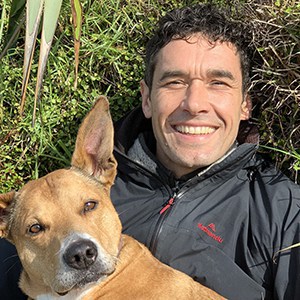

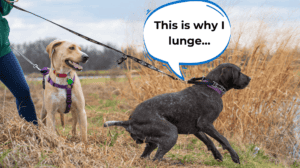
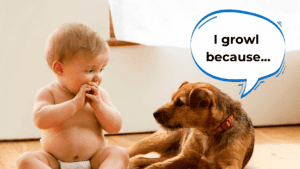
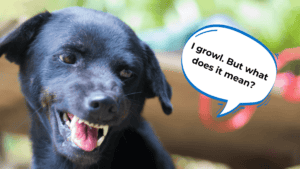
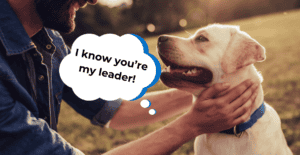
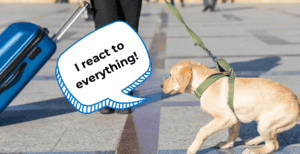
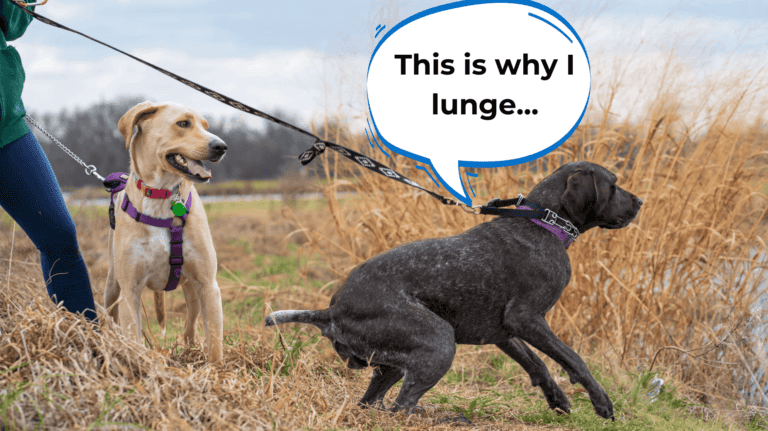
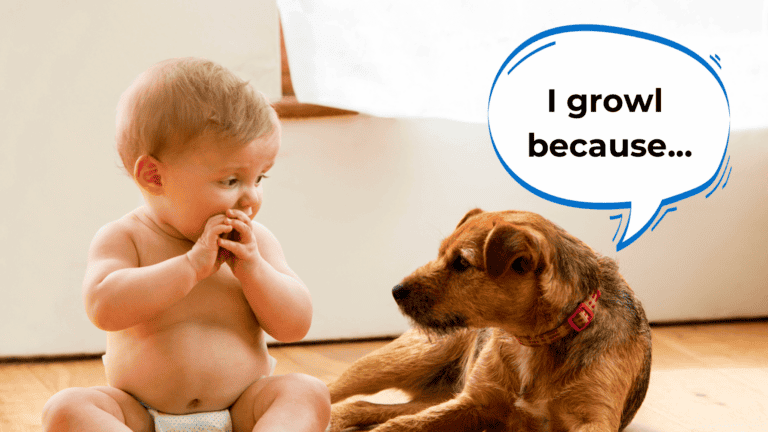
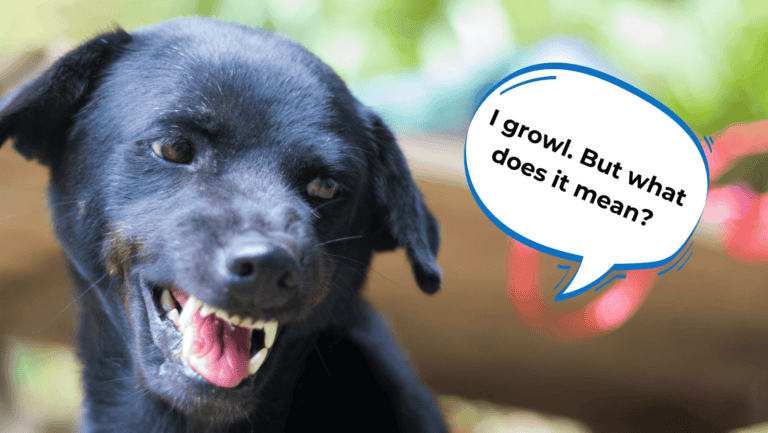

19 Responses
Loved this post! As someone who recently adopted a rescue dog, it’s been a struggle to deal with her aggressive behaviors. Your tips on recognizing and addressing triggers really resonated with me. Can’t wait to give the ‘leave it’ command a try!
Great stuff!
Just finished reading this post and I’m blown away by the progress you’ve made with these rescue dogs! I’ve been struggling with my own rescue pup’s aggressive behavior and your advice has given me new hope. Thank you for sharing your expertise and experience – it’s truly inspiring!
You’re very welcome!
I found this post to be incredibly informative and helpful. As someone who has recently adopted a rescue dog with aggressive tendencies, I was amazed at the variety of techniques and strategies you provided. Thank you for sharing your expertise and experience, I can’t wait to start working with my dog to address these issues and strengthen our bond. Please continue to share more insights and tips in future posts!
You’re welcome!
Great article! I recently adopted a rescue dog with a history of aggression, and I’m finding it challenging to manage his behavior. I’m so glad to see that there are effective techniques and strategies out there to help me address this issue. I’m looking forward to trying out the methods you’ve shared in this post. Thank you for sharing your expertise and helping us rescue dog parents navigate these complex behaviors!
You’re welcome! There’s loads more on my website https://theonlinedogtrainer.com
Loved this article! My rescue dog, Max, has been exhibiting aggressive behaviors towards other dogs and people, so I’m so glad I found this series. This post provides such helpful tips and insights. Can’t wait to try out the techniques and see the positive impact on Max’s behavior. Thank you for sharing your expertise!
You’re welcome! There’s a lot more at my website https://theonlinedogtrainer.com
I completely agree! My rescue dog, Max, has also shown signs of aggression, especially towards other dogs. It’s been a challenge to train him, but I’m glad to see there are resources available to help. I’ll definitely be trying some of the techniques mentioned in this post. Thanks for sharing!
You’re welcome
I completely agree that addressing the root cause of aggressive behaviors is key to resolving them in dogs. As someone who has worked with rescue dogs before, I’ve seen firsthand how important it is to understand their past experiences and traumas in order to help them overcome their aggression. Great post!
Love this series! My rescue dog, Max, has been exhibiting aggressive behaviors towards other dogs and people, and I’m desperate for help. I’ve tried different training methods, but nothing seems to be working. Hoping the tips in this post will help me finally address these issues and give Max the happy, well-adjusted life he deserves. Thanks for sharing your expertise!
You’re welcome
Great post! I’m definitely experiencing some of the issues you mentioned in my own rescue dog, Jax. He’s a lovable goofball but can be quite reactive and aggressive at times, especially towards other dogs. I’m excited to try some of the techniques you shared in this post to help him feel more calm and secure. Thank you for sharing your expertise!
You’re welcome
This is a great series on rescue dogs! I’m looking forward to learning more about how to help them overcome aggressive behaviors and create a happy, healthy home for both the dog and their family.
The most important step in correcting this behaviour is to understand WHY your dog is not relaxed around other dogs. Very often this is to do with them being stressed because of the role that they are playing and when you are able to communicate to them that they can switch off and relax, everything changes and is a lot easier.
Here is a link to a blog post that explains more about dog aggression:
https://theonlinedogtrainer.com/the-ultimate-guide-to-dealing-with-dangerous-dog-aggression-issues/
You would also benefit from a comprehensive training program as soon as possible. These can be found at TheOnlineDogTrainer.com for as little as $97USD.
All the best, Dan